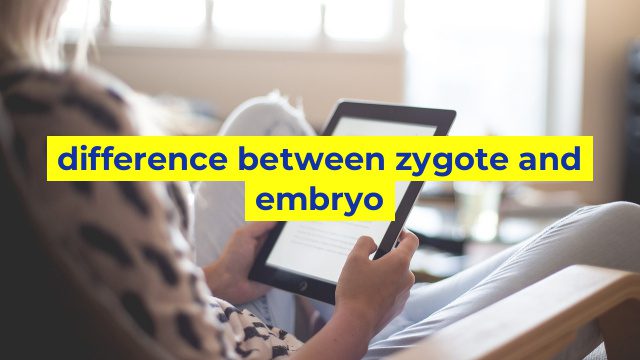Understanding the Difference between Zygote and Embryo
The journey of human life starts with a fertilized egg that eventually develops into a full-blown human being. However, many people often confuse the terms “zygote” and “embryo.” While they both refer to stages in human development, there are significant differences between them. In this article, we’ll explore these differences and what they mean for the developing fetus.
What is a Zygote?
A zygote is formed when a sperm cell fertilizes an egg cell during conception. It is a single-cell entity that contains all the genetic material required to form a human being. After fertilization, the zygote undergoes a process called cleavage, where it divides into multiple cells. The cells produced are identical and have the same genetic material as the original zygote. Over time, they continue to divide and differentiate into specific tissues and organs, forming the embryo.
What is an Embryo?
An embryo is the stage that follows the zygote. It starts from the first development of distinct features and lasts until the end of the eighth week of gestation. During this period, the embryo undergoes significant transformation, including the development of the head and growing of the limbs. At this stage, the neural tube and the heart begin to form, and the fetus’s organs start to differentiate.
During the embryonic period, the fetus is especially vulnerable to external influences that can negatively impact its development. These factors include exposure to toxins, infections, and poor nutrition. Therefore, mothers are encouraged to take extra care during pregnancy to mitigate potential negative impacts.
The Key Differences between a Zygote and an Embryo
The primary difference between a zygote and an embryo is their developmental stage. After conception, the zygote divides into multiple identical cells, while the embryo is a multicellular organism with distinct features and the start of organ formation.
Additionally, an embryo is more susceptible to external factors that can negatively impact its development than a zygote. Therefore, it is crucial for expectant mothers to take measures such as seeking the right prenatal care to ensure their fetus’ optimal development.
Conclusion
In conclusion, while zygotes and embryos both play a vital role in the development of a fetus, they represent different stages of growth. Understanding the differences between these two stages is crucial for expectant mothers and those seeking to understand the process of human development. By doing so, they can make informed decisions to protect and optimize the health and growth of developing fetuses.
Table difference between zygote and embryo
| Criteria | Zygote | Embryo |
|---|---|---|
| Definition | The first stage of development after fertilization | The stage of development from the zygote to about 8 weeks of gestation |
| Size | Single cell | Several hundred cells |
| Movement | Does not move | Moves through the fallopian tubes and attaches to the uterine lining |
| Developmental features | Fertilization, cell division, formation of blastocyst | Formation of major organ systems, differentiation of cells, limb buds start to form |
| Growth rate | Rapid cell division | Slower growth compared to the zygote stage |
| Duration | A few days | About 8 weeks of gestation |
| Viability | Not viable outside of the uterus | Can sometimes survive outside of the uterus with medical intervention after 24 weeks of gestation |

